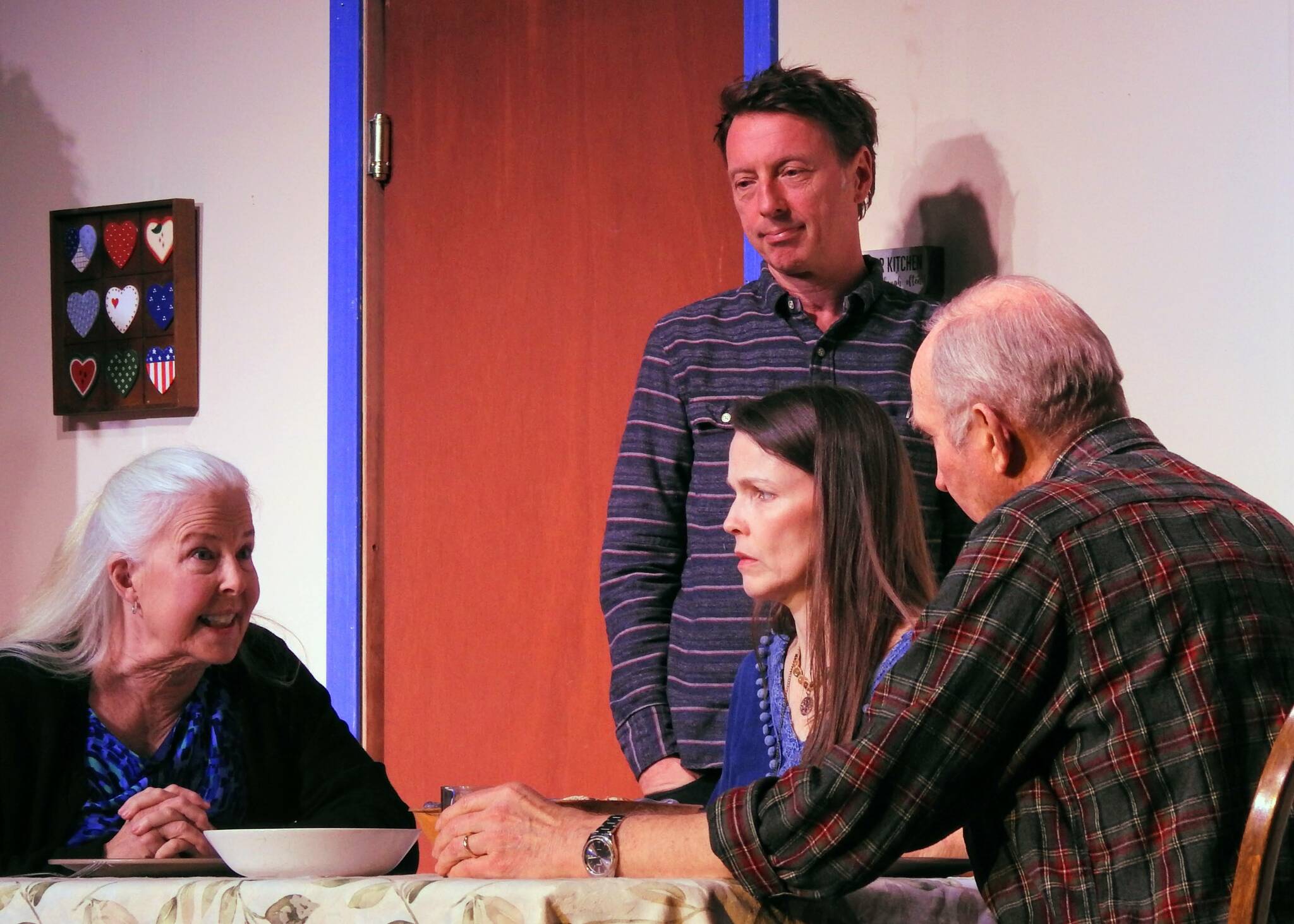Have you ever wondered what it would be like to have the heart of another person beating in your chest? Would there be any of the donor’s essence in that new heart? Would you feel what they felt when witnessing a beautiful sunset, or the joy of summer rain? And how do you handle knowing your life has been extended because another’s ended?
The emotional and personal impact of a heart transplant is the focus of “The Tin Woman,” a play in two acts written by Sean Grennan, running Fridays through Sundays, May 12 through May 28 at the Grange.
Joy, (played by Mary Taylor, in her first appearance with Actors Theatre of Orcas Island) receives a heart from Jack, a young man (played by Morgan Dews, also new to the group) who has tragically died in an automobile accident and whose death is grieved by his mother, Alice (Dorrie Braun), his father, Hank (Tom Fiscus) and his sister, Sammy (Valerie Buxbaum). Marjorie Blaine, another newcomer to the Grange stage, completes the cast by playing two roles: Joy’s cardiac nurse and her best friend, Darla who tries to bring humor and perspective to Joy’s post-surgical depression.
The play is both poignant and humorous and the cast brings to light the complexity of feelings shared by those who lost a loved one, and those whose life is spared because of that loss.
Perhaps because of the subject matter (and personal histories of the cast) the play has brought the cast quite close, according to stage manager Lynda Sanders.
“In the story, family is everything and I think because of that, everyone has grown into a sort of family,” she said, “and the cast, the music, the costumes, and the set all work together to support the story.”
The title “The Tin Woman,” is an obvious play on the Tin Man in L. Frank Baum’s “The Wizard of Oz,” who wanted a heart. Today, those in need of a heart don’t turn to the Wizard, but to the nation’s organ donor program.
For many, choosing to donate one’s organs can be as easy as checking a box on a driver’s license. It’s what happens when the need arises that an organ donation becomes a complicated reality. The United Network of Organ Sharing is the nation’s vital link in the organ transplant process. According to its website, “[the] policies and computerized network match donated organs with transplant candidates in ways that save as many lives as possible and provide transplant recipients with the best possible chance of long-term survival.”
Before an organ is allocated, all candidates for a transplant who are incompatible with the donor because of “blood type, height, weight and other medical factors” are automatically screened from any potential matches. Then the company’s computer system determines the order the other candidates will receive offers.
Because organ transplants are most successful when both the preservation and transport time is short, geography plays a factor in who receives the available organ. Further, the organ must be the right size, which means children often respond better to child-size organs; consequently, they are often first in line for children’s organs.
So, how does that massive database with available organs and waiting donors work? Often it relies on regional networks dedicated to working with potential patients and donors.
For the San Juans, Life Center Northwest is the islands’ local link to the national network. Jenna Pringle, communications specialist for the organization, acknowledged that checking the organ donor box on the Washington state driver’s license is certainly the first step to ensuring one’s organs are made available upon their death. However, to donate an organ anytime (like a kidney, for example), Pringle suggests signing up with LCNW and letting family members know of the request. She also clarified that, in cases where organs are to be donated upon death, how that death is managed can affect the viability of a donation.
“First responders often play a vital role with life-saving measures to keep blood flowing, ensuring an organ’s health.”
Pringle also noted that even if an organ becomes unusable, other parts can be retrieved and matched with a donor in need.
“Heart valves, skin, bones, arteries, and veins can all be retrieved and passed on to someone who needs them,” she explained.
“The Tin Woman” delicately addresses the depression and personal expectations that often visit an organ recipient and the donor’s family.
“That’s why we work closely with the organ donors and their families,” Pringle offered.
“We can be in the hospital when one passes and help the survivors with the necessary permissions if the deceased did not have an organ donor request in advance. If the person was registered, we can walk the survivors through the process during the days and weeks following. LCNW provides 18 months of grief support, helps with ‘remembering events,’ and facilitates communication, if desired, between the donor’s family and the recipient,” Pringle said.
Doug Bechtel, the play’s director, hopes the audience walks away with an understanding of the stress that can accompany such an intense situation.
“It’s not just the organ transplant itself,” he said. “It’s the subsequent trauma of getting from here to there, and we want the audience to recognize that there’s always a light at the end of the tunnel.”
Pringle also said that “donating one’s organ is the best gift we can give to each other. It can save the life of a neighbor, a teacher, or a friend. Organ donations are the best of humankind.”
Tickets to the show are $10 and can be purchased at Darvill’s Book Store, online at www.orcasactors.org, and at the theatre on the evenings of the performance. The play, suitable for all ages, may not appeal to pre-teens. For additional information, contact Bechtel at 360-317-5601.
It’s a show with a lot of heart.




